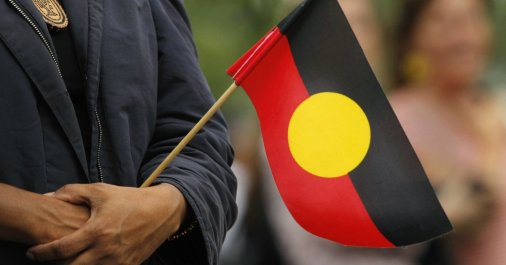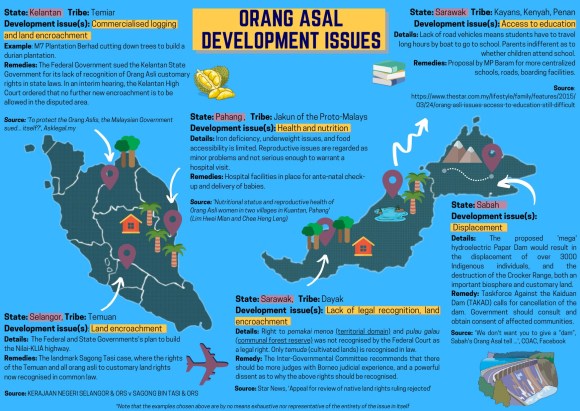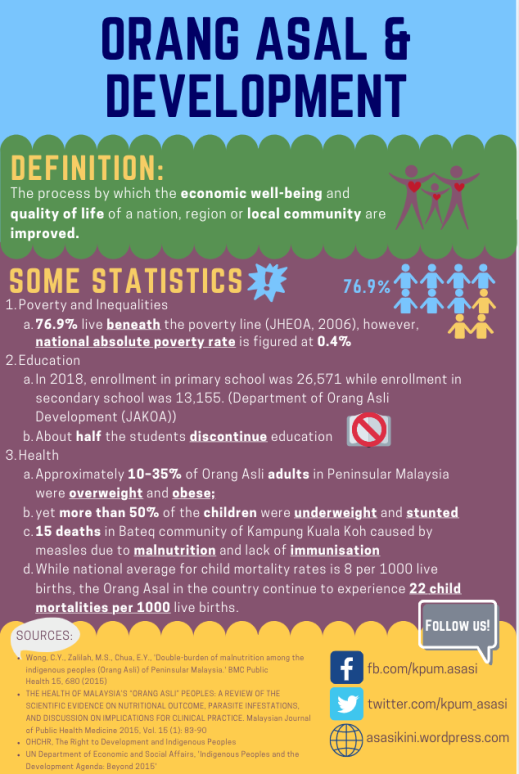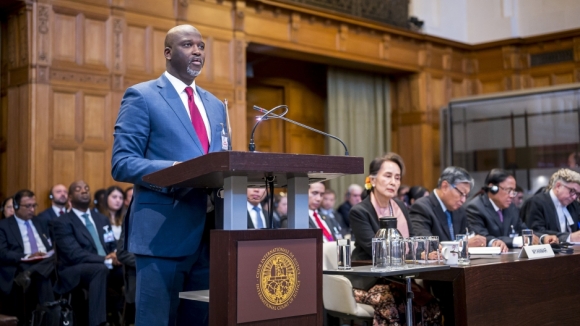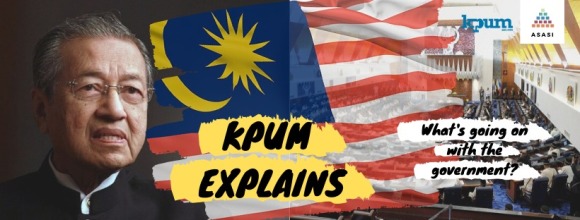
The events of the past 48 hours have upended Malaysian politics and left many puzzled over what the current state of the government is, and where the country is headed to next. Fuelled by coffee (and a shared sense of disbelief), our writers are here to break down precisely what’s happening, and the legal basis (if any!) for it.
Some Useful Vocab
We will be using the terms House of Representatives, Parliament and Dewan Rakyat interchangeably. In the context of this Article, they are all referring to the same thing.
We also use some abbreviations:
PM = Prime Minister
MP = Member of Parliament
YdPA/Agong/King = Yang di-Pertuan Agong
What Just Happened?
In short:
Parti Pribumi Bersatu Malaysia (BERSATU), which has 26 MPs, and 11 MPs from the Parti Keadilan Rakyat (PKR) under former Minister of Economic Affairs Azmin Ali have split from the previously-ruling Pakatan Harapan (PH) coalition.
- Why is this important? In order to form a government, the governing coalition must be able to command a simple majority in Parliament of 112 seats. With the defections, the Pakatan Harapan coalition only has 102 seats – leading to a hung parliament.[1]
Prime Minister Tun Dr. Mahathir Mohamad has also resigned as Prime Minister and as Chairman of BERSATU. Despite his resignation as Prime Minister of the PH government being accepted, the Yang di-Pertuan Agong has maintained Tun Dr. Mahathir as an interim Prime Minister.
- Why is this important? In line with the breakdown of the PH coalition, the Prime Minister advised the YdPA to revoke the appointment of his Cabinet Ministers (who were originally appointed by the Agong on the advice of the Prime Minister’s advice under Art. 43(1)(b) of the Constitution) as part of his interim caretaker role. As such, there are no longer any PH Cabinet Ministers.[2] [3] Although the Cabinet as a body still exists, it is currently only comprised of the Prime Minister who is ex officio its presiding officer.
As interim Prime Minister, Tun Dr. Mahathir will assume a caretaker role until a new government is formed,[4] or until he loses the confidence of a majority of the members of the Dewan Rakyat (which is currently on recess until 8 March 2020).[5] Given the unprecedented nature of the current situation, the exact nature of the operative caretaker convention is unclear, but it would be safe to assume that they are similar to those applicable during period in which Parliament is dissolved for a general election.
The remaining component parties of Pakatan Harapan – the Democratic Action Party (DAP), PKR, and Amanah – have all pledged their support to Tun Dr. Mahathir Mohamad, and will nominate him as the Prime Minister again. Parti Warisan Sabah (Warisan), which was the governing ally of Pakatan Harapan in Sabah along with the United Progressive Kinabalu Organisation (UPKO), has also thrown its weight behind the former Prime Minister, whilst remaining coy about supporting Pakatan Harapan itself. The stance of Gabungan Parti Sarawak (GPS) remains unclear.
- Why is this important? East Malaysian MPs will likely play a ‘kingmaker’ role in the formation of any coalition which will come to power; between them, Warisan, UPKO, and GPS have 28 MPs which, in the context of the fragmented party landscape, makes gaining their support essential for a majority. A more detailed breakdown of the number of MPs of each faction (and some potential coalitions that could arise) can be found here.
So…What Now?
In order to form a government, Article 43(2) of the Federal Constitution states that:
“(2) The Cabinet shall be appointed as follows, that is to say:
(a) the Yang di-Pertuan Agong shall first appoint as Perdana Menteri (Prime Minister) to preside over the Cabinet a member of the House of Representatives who in his judgment is likely to command the confidence of the majority of the members of that House; and
(…)”
In simple terms, the YdPA appoints as Prime Minister someone who is “is likely to command the confidence of the majority of [the Dewan Rakyat].” At the moment, there appears to be no clear majority in the Dewan Rakyat (112 seats) formed of the remaining members of the Pakatan Harapan or of the various members of the opposition, resulting in a hung parliament. This means that the various political parties will have to negotiate amongst themselves to form a new coalition. It is likely that once the YdPA is convinced that such a majority exists, Tun Dr. Mahathir will resign as interim Prime Minister (unless he has been made to resign due to a loss of confidence of the Dewan Rakyat) in order for the new head of government to be appointed.
But what if none of the parties can come to an agreement?
Although the Federal Constitution does not provide any straightforward guidance, there are two possible outcomes:
Business as usual
The current caretaker government will continue to exist until the interim Prime Minister is defeated by a vote of no confidence on the floor of the Dewan Rakyat.[6] The Constitution does not clearly indicate whether the YdPA may unilaterally dismiss a Prime Minister who has not lost the confidence of the Dewan Rakyat.
A minority government
Another possible outcome might be that the Agong chooses to install a minority government, consisting of a coalition that does not command a majority in Parliament, which would need to rely on other MPs for votes in the Dewan Rakyat to ‘survive no-confidence motions, pass budgets and secure essential legislation’.[7] Oftentimes however, minority governments by their very nature have proven to be weak and unstable. A notable recent exception was the 2017-19 Theresa May government, which was a minority government operating on a ‘confidence-and-supply’ agreement between the Conservative and Unionist Party and the Democratic Unionist Party.
Can the Agong unilaterally call for a general election?
In short, no. While Article 55(2) of the Federal Constitution grants the Agong the power to dissolve Parliament, this is qualified by Article 40:
“(1) In the exercise of his functions under this Constitution or federal law the Yang di-Pertuan Agong shall act in accordance with the advice of the Cabinet or of a Minister acting under the general authority of the Cabinet, except as otherwise provided by this Constitution; but shall be entitled, at his request, to any information concerning the government of the Federation which is available to the Cabinet.
(1A) In the exercise of his functions under this Constitution or federal law, where the Yang di-Pertuan Agong is to act in accordance with advice, on advice, or after considering advice, the Yang di-Pertuan Agong shall accept and act in accordance with such advice.
(2) The Yang di-Pertuan Agong may act in his discretion in the performance of the following functions, that is to say:
(a) the appointment of a Prime Minister;
(b) the withholding of consent to a request for the dissolution of Parliament;
(c) the requisition of a meeting of the Conference of Rulers concerned solely with the privileges, position, honours and dignities of Their Royal Highnesses, and any action at such a meeting,
and in any other case mentioned in this Constitution.”
Hence, whilst the Agong has the ability to withhold consent to the dissolution of Parliament, His Majesty may therefore only dissolve Parliament upon the advice of the Prime Minister. At the time of writing, Tun Dr. Mahathir has not made such a request, and the Agong is therefore obliged to allow the various political parties to attempt to form a simple majority in Parliament.
It may be possible that, in the case that Tun Dr. Mahathir loses the confidence of the Dewan Rakyat and where there is no other individual who is likely to command it under any political arrangement, there would be no individual who the YdPA may appoint as Prime Minister and, as such, no ability for a general election to be called. This possibility, although possible as a result of the drafting of the Constitution, is exceedingly remote given that parties would more likely agree to have confidence in a Prime Minister solely for the purpose of calling a general election.
Where To From Here?
The political parties will likely spend the next few days trying to gather their support to see whether they can meet the simple majority requirement in Parliament, and if successful, the YdPA will appoint the eighth Malaysian Prime Minister to head the Cabinet and form a new government. Should they fail to do so, the interim prime minister may advise the YdPA to dissolve Parliament and call for a general election – in which case, Malaysians (i.e. You!) will be able to cast your votes to break the deadlock and give a mandate to one of the coalitions formed.
Whilst this article has sought to deal with issues at the federal level, it is also important to note that the various state governments may switch political sides as a result of these defections.
As we wait to see what happens next, our writers are off to get Stick around and keep an eye on this page for more bite-sized information coming your way.
[1] ‘Harapan gov’t collapses but opponents have no clear majority either‘. (Malaysiakini, 24 February 2020). <https://www.malaysiakini.com/news/512034>. Accessed 24 February 2020.
[2] ‘Kenyataan Media: Kedudukan Anggota Pentadbiran Berikutan Peletakan Jawatan YAB Perdana Menteri Malaysia’.(Jabatan Penerangan, 24 February 2020). <https://twitter.com/JPenerangan/status/1231933316292460544>. Accessed 24 February 2020.
[3] ‘Pakatan govt automatically dissolved once PM resigned, say analysts’. (The Malay Mail Online, 24 February 2020).
<https://www.malaymail.com/amp/news/malaysia/2020/02/24/pakatan-govt-automatically-dissolved-once-pm-resigned-say-analysts/1840516?__twitter_impression=true>. Accessed 24 February 2020.
[4] ‘Dr M to helm nation until new PM appointed, cabinet formed’. (Malaysiakini, 24 February 2020).
<https://www.malaysiakini.com/news/512083>. Accessed 24 February 2020.
[5] ‘House of Representatives Calendar’ <https://www.parlimen.gov.my/takwim-dewan-rakyat.html>. Accessed 24 February 2020.
[6] Ibid.
[7] ‘Governing without a majority’. (The Star, 21 March 2012). <https://www.thestar.com.my/opinion/columnists/reflecting-on-the-law/2012/03/21/governing-without-a-majority/>. Accessed 24 February 2020.



